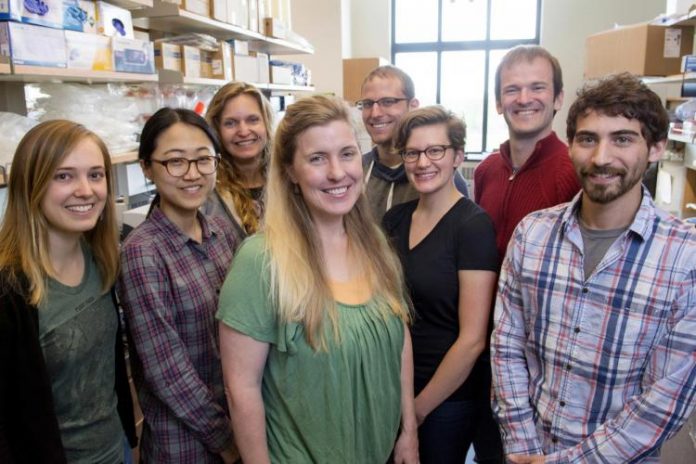Imagine a test that could tell you if you were infected with COVID-19 before you had a single symptom, came at an affordable price without the need to go to a doctor, and returned results in minutes.
Those who tested positive could swiftly quarantine themselves, while those who tested negative could head to work or spend time with family without fear of spreading infection.
That’s the vision behind a new University of Colorado-born technology that researchers are fast-tracking in hopes of not only helping to curb the current pandemic but also radically change the way we track disease in the future.
“With most infectious diseases, by the time you develop symptoms you have already been contagious for days and out and about spreading it to people,” said Nicholas Meyerson, a scientist in the department of Molecular, Cellular and Developmental Biology (MCDB) at CU Boulder and CEO of Darwin Biosciences, a startup formed to commercialize the SickStick. “Our device acts at the earliest stage of infection. It knows you’re sick before you do.”
For a decade, Meyerson has been working with MCDB Professor Sara Sawyer, a virologist at the BioFrontiers Institute, to understand the basic science underlying the body’s early immune response to infection. While most labs and tests have focused on antibodies—proteins in the blood that signal a mounting defense against a bacteria or virus—Sawyer’s lab has taken a different approach.
“Antibodies don’t arise in your body until after the copy number of a pathogen has gotten very large,” said Sawyer, noting that this can take days or—in the case of coronavirus—more than two weeks. “They are the last chapter in the immunology textbook. We specialize in the first chapter—the smoke signals that infected cells send off to indicate a pathogen is present.”
Disease ‘smoke signals’
Those smoke signals, called nucleic acids, rise up in the cells within hours of exposure to a virus and can make their way into saliva. With this in mind, and a $3 million grant from the Department of Defense in hand, Sawyer and Meyerson set out two years ago to develop a new kind of diagnostic test. Also involved are researchers from the labs of Associate Professor of MCDB Robin Dowell, Biochemistry Professor Roy Parker and Dr. Eric Poeschla at the CU Anschutz Medical Campus.
“There is a lot of utility in knowing that people are getting sick before they go and infect others, yet there is currently only one tool for knowing that – the thermometer,” said Sawyer, noting that because some pathogens don’t prompt fever it’s an unreliable tool. “Our technology fills a void.”
The user spits in a receptacle, sticks in a strip that soaks up the contents and within minutes—much like with an at-home pregnancy test—a series of lines appear.
The original prototype was designed to be agnostic about the kind of infection present: one line for healthy; two lines for sickness brewing. The researchers envisioned it being used on military bases. In another scenario, seemingly healthy civilians who had been exposed to a virus could pluck a SickStick off the shelf at the local drugstore and test themselves.
Then, coronavirus happened, and Meyerson and Sawyer quickly pivoted.
They’ve been in the lab ever since, working to identify biomarkers that will enable them to add a third line to the test that would indicate whether the user has coronavirus.
“Even before coronavirus it wasn’t hard to convince people that this device could be useful,” said Meyerson, noting that while antibody tests help identify who is sick or recovered, they do little to prevent unknowing carriers from spreading disease. “Now, in this world we are living in, where people are social distancing and self-quarantining, it’s very clear that it’s the device we need.”
From lab to market
Under normal circumstances, the path from lab to commercial availability could be years. But these circumstances are anything but normal.
“We have a very ambitious goal of six months,” said Sawyer.
With patents already secured, they have several clinical trials in the works to confirm that the test is accurate in predicting respiratory infections in general, and help them refine biomarkers to predict COVID-19 specifically.
This week, Darwin Biosciences won first place at the New Venture Challenge event, earning it an additional $55,000 boost on top of a $126,000 grant from Venture Partners, a CU Boulder office that also provides mentoring and support to researcher-led startups. In March, the company welcomed a new COO, Rick Whitcomb, a long-time biotech entrepreneur from Lyons whom they met at a Venture Partners event.
“I would be remiss not to call out the amazing biotech support network that CU Boulder and this community has offered us,” said Sawyer. “We are just university scientists who discovered we had our hands on something that can really matter. It’s remarkable how far we’ve come so fast.”
The SickStick team is now working on an advanced prototype and exploring what it will take to get clearance from the Food and Drug Administration, which has sharply expedited its review process for diagnostic tests for COVID-19.
While their timeline may not help to address the current situation, if a second wave of COVID-19 hits next fall, they’re confident SickStick could help prevent it from taking hold. And when other epidemics emerge, we’ll be ready.
“Long-term,” said Meyerson, “this could transform how we think about diagnosing disease.”















